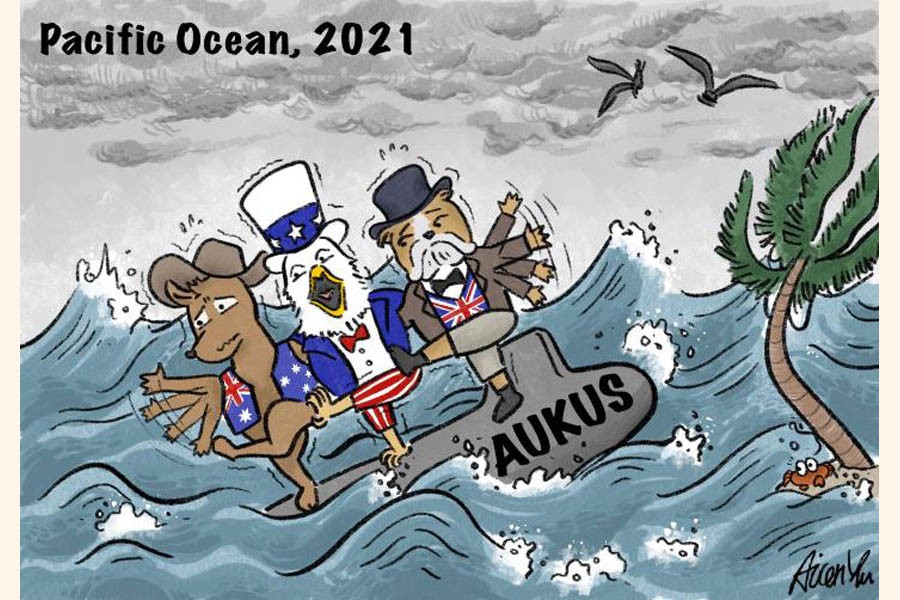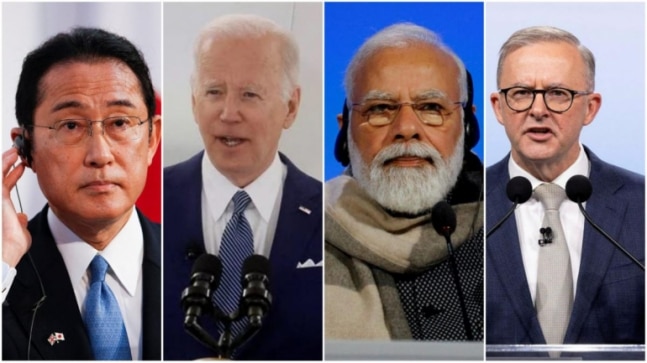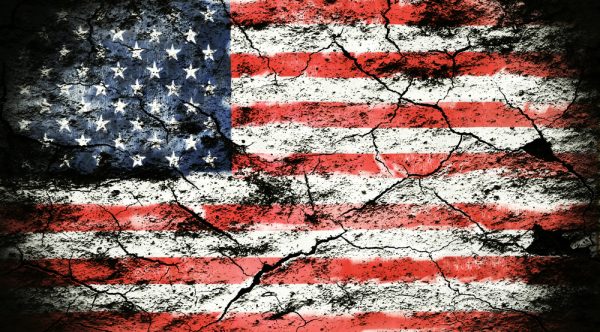Biden’s “Harakiri Diplomacy” in East Asia: War Drums Getting Louder. Threatening Korea and China with the Support of Japan
Diplomacy of a Falling Empire
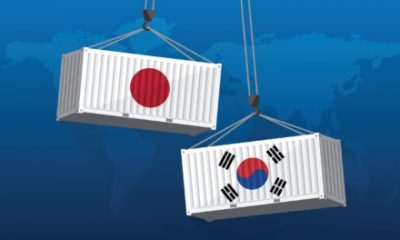
All Global Research articles can be read in 51 languages by activating the “Translate Website” drop down menu on the top banner of our home page (Desktop version).
To receive Global Research’s Daily Newsletter (selected articles), click here.
Visit and follow us on Instagram, Twitter and Facebook. Feel free to repost and share widely Global Research articles.
***
Introduction
East Asia had the opportunity of witnessing the diplomacy of one of the most seasoned diplomats of the United States — Joe Biden, President of the U.S. He spent five days in Korea and Japan from May 20 to May 24.
 The world was expecting to see real professional diplomacy which did not seek only the interests of the U.S.; The world was hoping to see a diplomacy which promoted also the interests of the partner countries, especially, Japan and Korea.
The world was expecting to see real professional diplomacy which did not seek only the interests of the U.S.; The world was hoping to see a diplomacy which promoted also the interests of the partner countries, especially, Japan and Korea.
However, to the great disappointment of many, Biden was repeating Washington’s old foreign policy determined by the warmongering CIA, the National Security Council and the Department of State.
As a matter of fact, Biden came to East Asia with the chilly wind of war and for the recruitment of soldiers who will fight for Washington.
This paper discusses two outcomes of Biden’s East Asia visit, namely, intensification of regional security risks and the recruitment of countries which will be asked to conduct proxy war against China.
Biden’s North Korea Policy and the Trilateral Japan-US- Korea Military Alliance
The regional security risk had increased due to the following decisions of Biden: the North Korea Policy, the trilateral military alliance of Japan-ROK-US and Biden’s declaration of American military intervention in a possible Taiwan-China war.
Biden’s North Korea policy offered nothing new. Instead, he has made two commitments which will surely further intensify the North-South tension; it may bring even possible armed conflict.
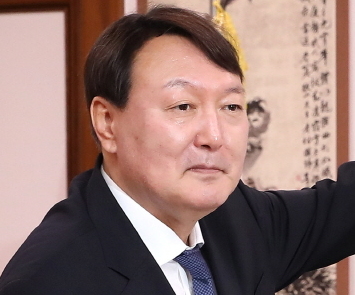 First, he accepted the request of the new conservative government of Yoon Suk-yeul to beef up the striking power of the ROK army by promising the deployment of strategic military assets such as, for instance, the strategic nuclear weapon.
First, he accepted the request of the new conservative government of Yoon Suk-yeul to beef up the striking power of the ROK army by promising the deployment of strategic military assets such as, for instance, the strategic nuclear weapon.
Second, Biden reiterated Washington’s favourite nuclear rhetoric:
“If Kim Jung-un denuclearizes North Korea, the U.S. might engage with Pyongyang for peace!”
What he was really saying is this:
“We have no intention of establishing peace on the Korea Peninsula.”
These two declarations of Biden have further alarmed North Korea which had been quite annoyed by Yoon’s previous declaration of his intention of pre-emptive attack against North Korea.
Now, the Japan-Korea-US trilateral military alliance (JKUS military alliance) in practice means a de facto Japan-Korea military alliance.
The military relation between Korea and the U.S. is more than a military alliance, because Washington can command the ROK army in case of war. In fact, South Korea is a part of American armed forces as long as Washington has the OPCON (the right of Washington to command the ROK armed forces in war involving South Korea).
What is worrisome regarding the Japan-Korea military alliance is the possibility of the presence of the Japanese military on Korean soil.
For Koreans, such a possibility is a nightmare, because they know that Japan’s ambition of ruling Asia again — especially Korea — is still alive. In particular for North Koreans, this military alliance could lead to a possible participation of the Japanese Armed Forces in an attack against North Korea.
North Korea is already reacting violently. Recently, it launched 13 missiles including 4 missiles simultaneously to show that it can hit several targets at the same time. These missiles are short-range or medium-range missiles threatening South Korea and Japan.
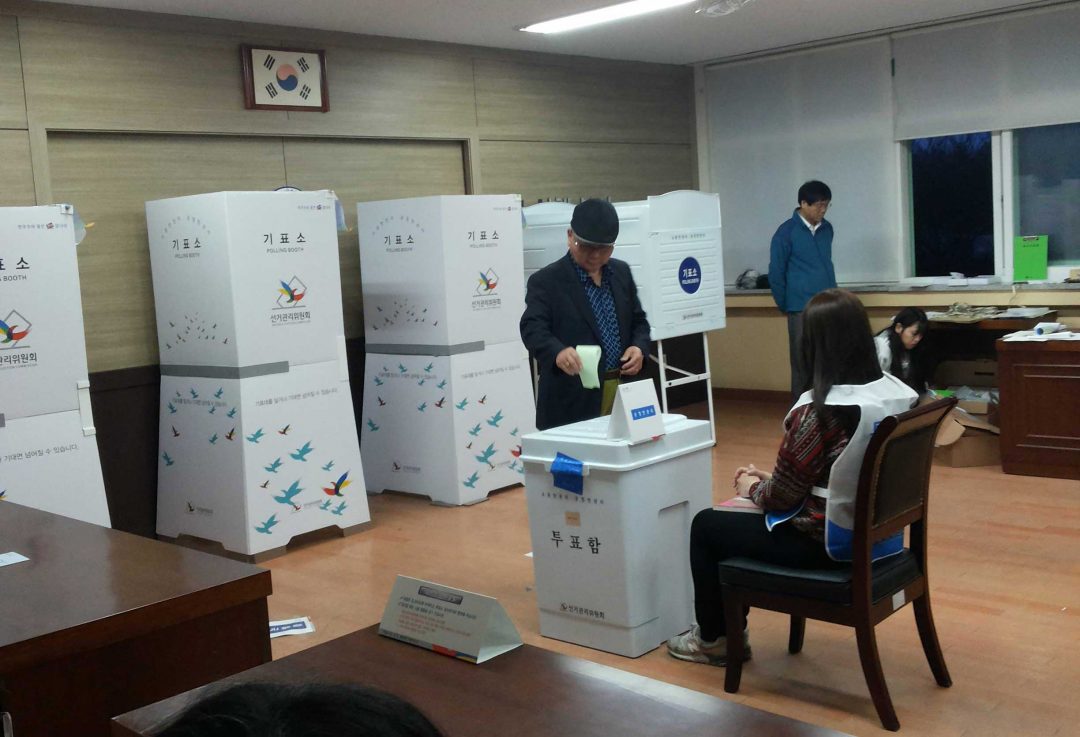 There is no doubt that the election of Yoon as president representing the anti-North Korean pro-Japan South Korean conservatives combined with the warmongering Washington establishment and the Japanese ambition to restore the glory of the Meiji Era are enough to threaten North Korea.
There is no doubt that the election of Yoon as president representing the anti-North Korean pro-Japan South Korean conservatives combined with the warmongering Washington establishment and the Japanese ambition to restore the glory of the Meiji Era are enough to threaten North Korea.
February 2022 ROK Elections
Under such circumstances, North Korea might decide to join the Russia-China bloc in a global “East-West shooting war” and the reunification will be no more; South Korea will meet its death. Yoon will remain the worst traitor to the Korean Nation.
Biden’s Reckless Taiwan-China Diplomacy
What is even more terrifying is Biden’s declaration of military intervention in the event of Taiwan-China war. This is surely an intervention into China’s internal affairs.
The world knows that the U.S. has recognized the One-China policy by virtue of the three joint statements (1972, 1979 and 1982) and the Taiwan Relation Act (1979). In fact, Biden admitted the One-China policy only a few months ago.
 However, Washington has been violating the One-China principle for decades through the policies of the American Institute in Taiwan (AIT). In accordance with the 1982 Agreement with China (the 6 Assurances of Donald Reagan), Washington can provide only “defensive weapons” to Taiwan. But I wonder if there is such thing as defensive weapon. For decades, Washington has been pouring billions of dollars worth of weapons. Trump gave Taiwan 4 billion USD every year. Can we believe that all these weapons are only for defensive purposes?
However, Washington has been violating the One-China principle for decades through the policies of the American Institute in Taiwan (AIT). In accordance with the 1982 Agreement with China (the 6 Assurances of Donald Reagan), Washington can provide only “defensive weapons” to Taiwan. But I wonder if there is such thing as defensive weapon. For decades, Washington has been pouring billions of dollars worth of weapons. Trump gave Taiwan 4 billion USD every year. Can we believe that all these weapons are only for defensive purposes?
In a way, the contradictory Taiwan policy of Washington is understandable for Taiwan is in fact the American fixed aircraft carrier threatening China at its front door.
It is said that if U.S. loses Taiwan, its regional interests in East Asia will be seriously damaged. This is the worst kind of imperialist attitude. How can a country claim its interest by arming a foreign sovereign country?
But, for China, a Taiwan armed to the teeth by the US is an intolerable threat. So, Washington is provoking a collision course with China.
By inciting China’s PLA to invade Taiwan, Washington is intent upon breaking one of the conditions which could justify such an invasion.
There are five conditions which would allow Beijing to intervene in Taiwan:
- Taiwan’s declaration of independence,
- Internal turmoil in Taiwan,
- Taiwan’s military alliance with a foreign country,
- Taiwan’s acquisition of weapons of mass destruction (WMD) such as strategic nuclear weapon and
- Violation of the Taipei-Beijing Consensus for 1992 One-China principle.
Washington can ask Japan to provoke a situation in which one of these conditions can be broken even without the declaration of Taiwan independence.
 The easiest thing to do is to send a WMD to Taiwan such as a strategic nuclear weapon or organize internal turmoil within Taiwan or form a Japan-Taiwan military alliance.
The easiest thing to do is to send a WMD to Taiwan such as a strategic nuclear weapon or organize internal turmoil within Taiwan or form a Japan-Taiwan military alliance.
Japan will be happy to accommodate such a request by Washington because it is the dream of the Neo-Meiji Restoration Group (NMRG) led by former Prime Minister Shinzo Abe to beat China with Washington’s help and become once again the ruler of Asia, if not the world.
Thus, to be sure, Biden was successful in making the war drum to sound louder in East Asia.
Recruitment of Proxy War Soldiers
The Japan-Korea bilateral military alliance is intended to recruit proxy-war soldiers. As pointed above, if Washington decides to attack North Korea, the ROK army and the Japanese army are likely to fight for the hegemony of Washington and for Japan’s re-conquest of Korea.
What is more important for Biden is the recruitment of soldiers to fight against Chinese forces in US sponsored Taiwan-China war. The same ROK soldiers and the Japanese soldiers are expected to do the shooting on behalf of Washington. It is possible that Washington would not join the shooting match; it will just provide more weapons as it is doing in the Ukraine-Russia war.
One puzzling aspect of this dangerous security dynamics of East Asia initiated by Washington is the “harakiri” — security strategy of the pro-Japan conservative South Korean government led by Yoon.
South Korea’s participation in the attack against North Korea will bring nothing positive. In fact, millions of South Koreans may lose their lives and its economy will be ruined.
Furthermore, the participation of the Japanese army in this attack against North Korea could end up with a permanent presence of the Japanese military on Korean soil and even the 1910 treacherous drama of annexation of Korea with Japan may repeat itself. It is likely that the pro-Japan conservative Koreans will support it like their ancestors did in 1910.
This may sound absurd. But do not forget one thing. The core of the pro-Japan South Koreans is composed of the descendents of former Korean elite who collaborated with the Japanese colonial government and those Japanese who did not return to Japan to protect their wealth and adopted Korean names to hide their identity. To be frank, this group is more Japanese than Korean.
Moreover, the participation of the South Korean army in the Taiwan-China war would create a situation in which South Korea will have to endure China’s trade reprisal and even direct military bombardment on Korean soil.
About a quarter of South Korean exports go to China. A simple deployment few years ago of THAAD near Seoul made South Korean pay a heavy price in terms of loss of income from tourism, the campaign of “No Korean Products” in China, the forced closing of Korean companies in China and other forms of retaliation. The U.S. cannot and will not compensate for such a huge loss.
For Korea, the only wise way of surviving in the Sino-American hegemonic confrontation is to be neutral and maintain friendly relations with both the U.S. and China. This is what Moon Jae-in did. Alas, Yoon blew away what Moon has accomplished. This is tragic, indeed.
The liberal government of Moon Jae-in was able to maintain reasonable good relations with both superpowers. Korea, being the 10th global economic power and the 6th military power, could bargain to Korea’s advantage with Beijing and Washington.
Now, as for Japan, the Japanese imperialist conservatives led by former Prime Minister Shinzo Abe are more than happy to be legionnaires in the Taiwan-China war. For Abe and his friends, the Taiwan-China war can be a God-given gift.
Remember that the Abe group has the dream of restoring the might and glory of pre-1945 Japan. This group denies Japan’s surrender in 1945; it does not accept the Tokyo War Criminal Court. It has the illusion of being the predestined ruler of the world.
To realize its dream, Japan has to destroy China. To destroy China, Japan needs a regular army, not just the so-called self-defence army. To do this, Japan has to modify the 1948 Peace Constitution, especially the controversial Article 9. However, the materialization of Abe’s dream needs Biden’s support.
Biden is aware of the danger that Japanese have not forgotten the Hiroshima-Nagasaki bombing. The Americans do remember the massacre of Pearl Harbor. It is more than possible that Biden does not want see Japan too powerful.
But to “Kill China”, Biden Needs Military Japan
Biden’s declaration of military intervention in the Taiwan-China war was intended to recruit the Japanese army as proxy army fighting for the U.S. The same goes for the ROK army.
For Biden, the Japanese army is the best legionnaire to fight against China. To force China to attack the Senkaku/Diaoyu Islands or Taiwan, Japan might provoke incidences leading to war. In fact, Japan is good at it.
The Mukden incidence in Manchuria in 1931 leading to Japanese invasion in Manchuria and the Marco Polo Bridge incidence provoking an all-out war with China in 1937 started because of faked incidences prepared by the Japanese army.
In short, Biden did well in recruiting the armed forces of the two major military powers in the region as legionnaires in the case of a possible Taiwan-China proxy war.
Biden and the Indo-Pacific Economic Framework (IPEF)
In addition to the recruitment of the two military powers, Korea and Japan, Biden was successful in producing another China containment organization comprising of 13 countries through the Indo-Pacific Economic Framework (IPEF).
This is composed of 7 ASEAN member countries (Singapore, Indonesia, Malaysia, Thailand the Philippines, Vietnam, Brunei) and the U.S., India, Japan, ROK, Australia, New Zealand.
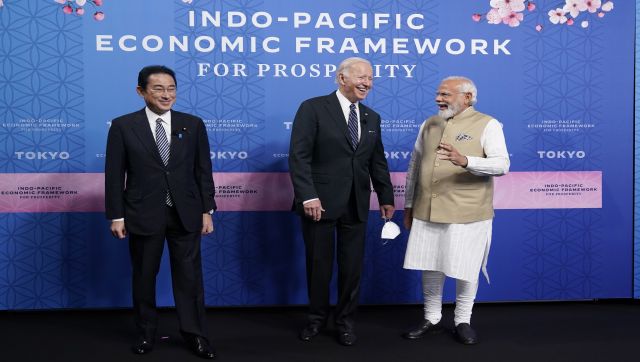
Japanese Prime Minister Fumio Kishida, left, President Joe Biden and Indian Prime Minister Narendra Modi, Indo-Pacific Economic Framework for Prosperity, May 23, 2022 (Thanks to AP /Evan Vucci)
The purpose of this new organization is to contain China. The IPEF gives itself four areas of regional cooperation including realignment of the production chain, renewable energy, trade and fight against corruption. However, the ultimate role is to contain China intensified by the restriction of exchanges of goods, ideas and services especially exchange of technology.
Most of the experts in Korean trade and international politics argue that this could bring disaster to Korea due to possible retaliation on the part of China.
Japan looks very excited to be a part of IPEF for it will provide opportunities to play a leadership role with help of the ROK as a cheer leader.
The assurance of investments of USD 27 billion in the U.S. by Samsung and Hyundai is a big gain for Biden. And these investments will strengthen America’s competitiveness in electric cars and semi-conductors. They will be a part of US’ China containment policy China.
The Indo-Pacific Economic Forum (IPEF) is, in fact, an additional China containment policy in order to strengthen the effectiveness of anti-China strategies. Up to now, the previous strategies have not been effective.
Since the time of Obama, Washington has been trying to contain China through several strategies, but none of them has yielded expected results.
The deployment of the U.S. Naval task force in the South China Sea led to the militarization of the Chinese reefs.
The Trans-Pacific Partnership (TPP)
The TPP went nowhere, because it had two contradictory objectives, namely trade promotion and China containment.
If the objective was regional trade promotion, China should be included.
If the objective is China containment, China will retaliate and the member countries’ trade with China will fall.
The ensuing loss of trade with China could be greater than the gain of trade with its TPP member countries. So, it is a deficit game for member countries unless Washington compensates the deficit.
The question is: “Can Washington afford it?” No wonder why Trump decided to withdraw from it.
TPP has now become CPTPP also known as TPP-11 (The Comprehensive and Progressive Agreement for Trans-Pacific Partnership of eleven countries including Australia, Brunei, Canada, Chile, Japan, Malaysia, Mexico, New Zealand, Peru, Singapore and Vietnam), which seems to be more than trade. But, to the extent that Japan leads it, it could become a China-containment weapon, because Japan still has the ambition of ruling Asia.
The Exclusive “Anglo-American-Ozzie”AUKUS Military Alliance.
The effectiveness of AUKUS as a military alliance remains to be proven. The new Prime Minister of Australia may have different ideas about Australia-China relations. The new Foreign Minister of Australia, Penny Wong, is known to be pro-China and her boss Anthony Albanese, the new Prime Minister of Australia, proposed a softer approach to China policy.
Source: Financial Express
The Quadrilateral Security Dialogue (Quad)
The effectiveness of Quad depends on how India would react in case of war with China. India belongs to several multinational organizations such as BRICS, SOC, RCEP where India maintains good relations with China.
India PM Narendra Modi, US president Joe Biden, Japanese PM Fumio Kishida, Australian PM Anthony Albanese, Quad summit in Tokyo on May 24.
India is not sure of Washington’s security guarantee in the long run. India is disappointed of being excluded from AUKUS. India is fearful of Chinese retaliation. For all these reasons, India’s membership in Quad does not seem to be as strong as that of Japan.
The IPEF is Biden’s idea of containing China. This replaces the TPP and it is supposed to be trade-oriented with the hidden objective of destroying China. Therefore, it has the same dilemma as TPP. Whether its objective is for trade or China containment, the probability of success is low. Remember that all the member countries depend heavily on China for trade and investment.
Galloping Inflation: Economic and Social Crisis in America
However, the most serious stumbling block to the U.S. global hegemony are the worsening internal problems within the United States.
The inflation which could become galloping, intensifying street killings, decaying infrastructure, increasing number of people suffering from hunger, crowed city streets by the homeless and the jobless, soaring medical care cost preventing millions of people from getting medical care and rising number of school kids who starve due to ugly income inequality are all the sign of declining Pax Americana.
It appears that the priority should be given to the solution of the internal problems.
Some people may say that Biden, the great expert of diplomacy, has harvested rich rewards from his Asian tour. I do not share such praise.
I think that he has demonstrated what might be described as the diplomacy of a falling empire.
There are three ways of dominating the world: economic domination, ideological domination and military domination. But the military domination is powerless without economic domination and ideological backing.
America’s Global “Harakiri”. Diplomacy of a Falling Empire
The America’s economic domination is weakening due to its endless economic war;
its ideological domination is fading due to wrong management of democracy.
What is left is military domination.
Biden is resorting to the military domination without strong economic support and ideological backing. This is the symptom of a falling empire.
Biden’s diplomacy is, perhaps, the desperate efforts to save the falling empire through military might.
But, Biden’s pursuit for military domination will inevitably lead to global suicide of humanity and its shameful end.
*
Note to readers: Please click the share buttons above or below. Follow us on Instagram, Twitter and Facebook. Feel free to repost and share widely Global Research articles.
Dr. Joseph H. Chung is professor of economics, and member of the Research Center on Integration and Globalization (CIEM) of University of Quebec in Montreal (UQAM).
He is Research Associate of the Centre for Research on Globalization (CRG).


